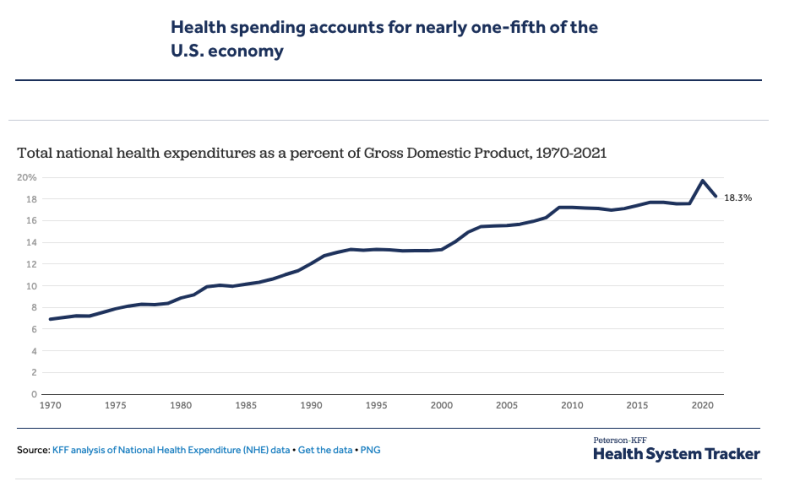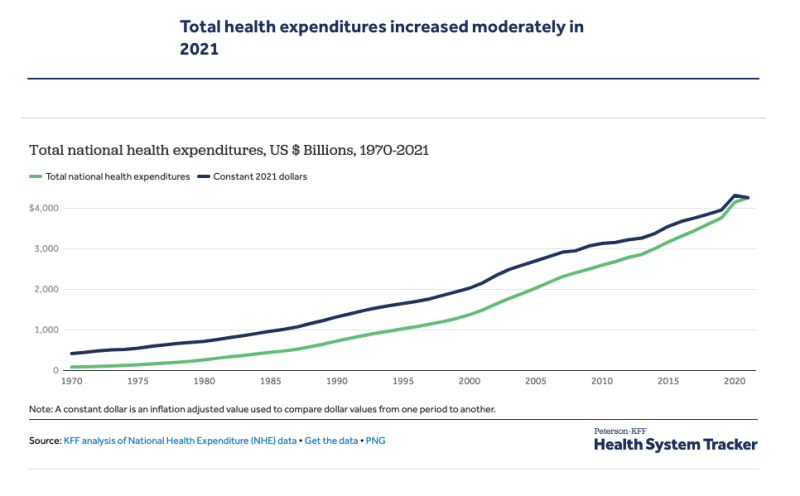Table of Contents
Healthcare Administration Career Outlook
Demand for Healthcare Services Continues to Remain Strong
The demand for healthcare services in the United States has risen steadily over the past 50 years. This level of demand is expected to continue. Currently, healthcare administration represents nearly 20% of the U.S. economy, totaling nearly $4.3 trillion. See illustrative graphs below.


Demand for Leaders and Managers of Healthcare Services Stronger Than Other Management Occupations
The U.S. Bureau of Labor Statistics projects a nearly 30% growth in healthcare administration jobs over the next decade. See chart. The following is an excerpt of the job outlook for healthcare administration jobs from the U.S. Bureau of Labor Statistics:

As the large baby-boom population enters older age groups, which typically experience more health problems, there should be increased demand for healthcare services. This means there will be greater need for physicians and other healthcare workers, medical procedures, and healthcare facilities, and therefore greater need for managers to organize and oversee medical information and healthcare staff. These managers are important for improving care coordination, which is key in team-based care.
In addition, widespread use of electronic health records (EHRs) will continue to create demand for managers with knowledge of health information technology (IT) and informatics systems. Medical and health services managers will be needed to organize, oversee, and integrate these records across areas of the healthcare industry.
Healthcare Administration Course Sequence
ECON150 - Economic Principles and Problems-Micro (3)
HCA285 – Introduction to Healthcare Administration (3)
HCA290 – Healthcare Law and Ethics (2)
MATH221B - Biostatistics (3)
HCA340 – Managing Healthcare Provider Organizations (3)
HCA360 – Healthcare Systems (3)
HCA380 – Healthcare Strategy (3)
HCA395 – Healthcare Insurance (3)
HCA445 – Healthcare Finance (3)
HCA455 – Healthcare Operations (3)
HCA490 – Healthcare Administration
Capstone (2)
HCA498R – Healthcare Administration Internship (2)
BA211 - Business Fundamentals (3)
ACCTG180 - Survey of Accounting (3) or ACCT201 – Financial Accounting (3)
FIN301 - Financial Management (3)
SCM361 - Production and Operations Management (3)
Students are strongly encouraged to complete 200-level courses before registering for 300-level courses, and to complete all 300-level courses before registering for 400-level courses. Below is a suggested sequence of courses over eight semesters.
HCA285 – Introduction to Healthcare Administration (3)
BIO230 - Essentials of Human Anatomy & Physiology (4)
HCA290 – Healthcare Law and Ethics (2)
MATH221B - Biostatistics (3)
ACCTG180 - Survey of Accounting (3) or ACCT201 – Financial Accounting (3)
HCA360 – Healthcare Systems (3)
SCM361 - Production and Operations Management (3)
FIN301 - Financial Management (3)
HCA445 – Healthcare Finance (3)
HCA490 – Healthcare Administration Capstone (2)
Minors & Making The Most Of Elective Credits
Because healthcare organizations are comprised of several functional areas, many students find it helpful to supplement their degree in healthcare administration with a minor that is focused on one of these functional areas. Below is a list of some of these areas and associated minors or certificates that can be earned through the wise use of your elective credits while here at BYU-Idaho.
Students Can Also Earn a Minor or Cluster in Healthcare Administration
Pairing a Healthcare Administration minor or cluster with degrees in business disciplines such as management, finance, marketing, operations, and others, including data analytics or computer science, can be an effective and powerful way to prepare a student to enter work in the healthcare industry.
A Deeper Dive Into Healthcare Administration Careers
A great source to find information about careers is a professional organization designed for a particular career. Professional organizations function to provide general career information, continuing educational resources, career networking opportunities, and certifications for professionals working in a specific career. There are several healthcare administration professional organizations which represent various sectors or functions of the healthcare industry. The following is a list of these and a link to the professional organization associated with it.
National Center for Assisted Living
Skilled Nursing Facilities
American Health Care Association
Ambulatory Surgery Centers
Ambulatory Surgery Center Association
Physician Practices
Medical Group Management Association
Acute Care Hospitals
American College of Healthcare Executives
Financial Management of Healthcare Facilities
Healthcare Financial Management Association
Healthcare Strategy, Marketing, and Communications
Society for Health Care Strategy and Market Development
Healthcare Quality
Healthcare Administration Internships
Completing an internship is required for the Healthcare Administration degree. The link below is to the healthcare administration internship guide. This guide will answer many questions regarding healthcare administration internships.

Healthcare Administration Alumni

Hayden Nielsen is currently working at Mayo Clinic in a dual role as the Operations Manager for the Department of Medical and Surgical Gynecology and as the Operations Manager of the Mayo Clinic Graduate School of Biomedical Sciences. He joined the organization in 2020 as an Administrative Fellow. Prior to Mayo Clinic, he received a Bachelor of Science in Healthcare Administration from Brigham Young University-Idaho. While at BYU-Idaho, he completed two internships at Primary Children’s Hospital in Salt Lake City in Patient Experience and Quality Improvement. Hayden received a Master of Health Administration from Cornell University in May 2020. While in graduate school, he completed a Business Operations internship at American Vision Partners in Tempe, Arizona, and also worked as a Graduate Consultant for the Monroe Plan for Medical Care in Rochester, New York.

Bryce Bond currently serves as the Ambulatory Quality Supervisor for Seasons Medical, a multi-specialty healthcare group that includes physicians practicing in the areas of family medicine, internal medicine, obstetrics and gynecology, and pediatrics. As Ambulatory Quality Supervisor, Bryce leads other care coordinators in the areas of population management and clinical improvement activities. Bryce also maintains the Primary Care Medical Home recognition for Seasons Medical and other affiliated physician practices. Other duties that Bryce fulfills include overseeing initiatives to lower costs in collaboration with various healthcare payers, maintaining provider schedules, and managing registration and admitting functions.
Bryce began working full time at Seasons Medical after completing an internship with them while studying healthcare administration at BYU-Idaho. Bryce from BYU-Idaho in 2016 with a Bachelor of Science in Healthcare Administration.
